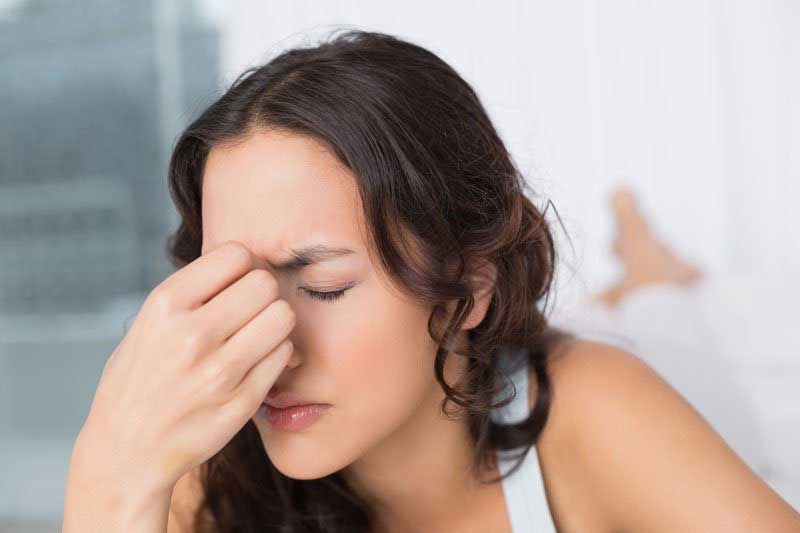Understanding Post-Meal Headaches: Causes And Effective Remedies
05
Sep
2023
We've all experienced that discomforting post-meal headache at some point in our lives. It can turn a satisfying meal into a miserable experience. But what causes these headaches, and what can you do to prevent or alleviate them? In this blog, we'll dive into the common causes of post-meal headaches and explore effective remedies to help you enjoy your meals without the looming pain.
Common Causes of Post-Meal Headaches
Low Blood Sugar (Hypoglycemia)
Low blood sugar levels, often triggered by skipping meals or consuming high-sugar foods, can lead to post-meal headaches. When your blood sugar drops after a meal, it can cause a pounding headache.

Food Triggers
Certain foods and ingredients can be headache triggers for some individuals. Common culprits include monosodium glutamate (MSG), artificial sweeteners, and nitrates found in processed meats. Additionally, caffeine withdrawal can lead to headaches if you're accustomed to having coffee or other caffeinated beverages with your meals.
Dehydration
Not drinking enough water throughout the day can result in dehydration, which can lead to headaches. Meals high in sodium can exacerbate this issue, as salt can dehydrate the body.
Food Allergies or Sensitivities
Undiagnosed food allergies or sensitivities can cause post-meal headaches. For example, some individuals may be sensitive to gluten or dairy products, and consuming them can trigger headaches.
Overeating
Excessive consumption of food can put pressure on your stomach and lead to indigestion, which may manifest as a headache. Overeating can also cause fluctuations in blood sugar levels.
If you're struggling with persistent post-meal headaches and need professional guidance to identify their causes and effective remedies, don't hesitate to reach out to the experts at Hill Regional Hospital. Contact us today at 254-580-8500 to schedule a consultation or learn more about our services.
Effective Remedies for Post-Meal Headaches
Stay Hydrated
Start by ensuring you're adequately hydrated throughout the day. Drinking water before, during, and after meals can help prevent dehydration-related headaches. Limiting your intake of high-sodium foods can also aid in maintaining proper hydration.

Balanced Meals
Focus on balanced meals that include a combination of protein, healthy fats, and complex carbohydrates. Avoid excessive sugar and refined carbohydrates, which can cause blood sugar spikes and crashes. Eating regular meals and snacks can help stabilize blood sugar levels and prevent hypoglycemia-related headaches.
Identify and Avoid Triggers
Pay attention to which foods or ingredients might be triggering your headaches. Keep a food diary to track your meals and note any patterns related to post-meal headaches. If you suspect certain foods are causing the issue, consider eliminating them from your diet.
Moderation
Avoid overeating by practising portion control. Eating slowly and mindfully can help you recognize when you're satisfied, preventing excessive consumption and indigestion.
Caffeine Management
If you're a regular caffeine consumer, try to maintain a consistent caffeine intake. Abruptly quitting caffeine can lead to withdrawal headaches. Gradually reducing your caffeine intake or ensuring you have a small amount with your meals can help.
Consider Food Sensitivity Testing
If you suspect food allergies or sensitivities, consult with a healthcare professional. They can recommend food sensitivity testing or other diagnostic measures to identify potential triggers.
Manage Stress
High-stress levels can contribute to headaches. Incorporate stress management techniques into your daily routine, such as meditation, deep breathing exercises, or yoga, to help reduce tension and prevent stress-related headaches.
Post-meal headaches can be a significant source of discomfort, but with a better understanding of their causes and the implementation of effective remedies, you can find relief. Remember that individual triggers may vary, so it's essential to pay attention to your body and make dietary and lifestyle adjustments accordingly. If your post-meal headaches persist or worsen, consult a healthcare professional for a thorough evaluation and personalized guidance on managing this issue. By taking proactive steps, you can enjoy your meals without the looming threat of post-meal headaches and savour the dining experience to the fullest.